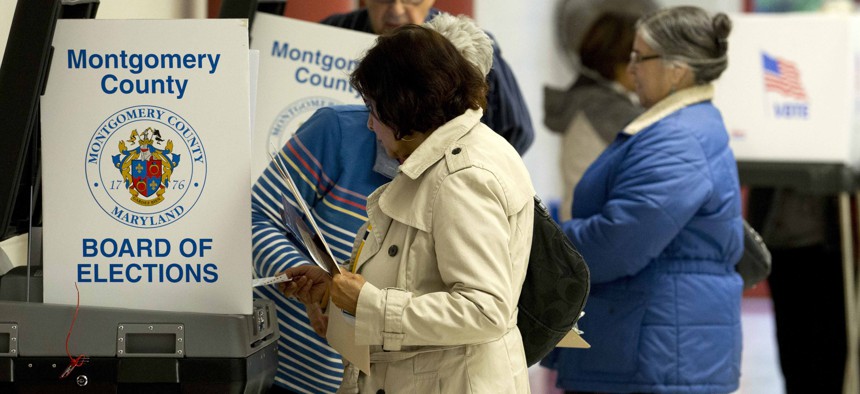Ensuring That People Can Easily Understand the Ballot Measures They’re Voting On

People cast their vote in the scanner machine at polling place during the U.S. midterm election Tuesday, Nov. 6, 2018, in Silver Spring, Md. AP Photo/Jose Luis Magana
A Maryland bill would set new guidelines for describing proposals put on the ballot in plain language.
Legislation introduced by a Maryland lawmaker would set new standards for describing ballot measures in the state, with the aim of ensuring that people can clearly understand the proposals they’re casting votes on.
The bill calls for ballot questions to appear with a concise statement explaining their purpose—one that can be understood by someone who can read at a 6th grade level.
State Sen. Cheryl Kagan, a Democrat who represents a district that covers suburban areas near Washington, D.C., pre-filed the bill last year, teeing it up for possible consideration in a legislative session set to begin Jan. 8.
"When we want people to cast a ballot to express their views on important ballot measures, it seems only fair that we can make it clear enough so that they understand the choice that they're being asked to make," Kagan told Route Fifty on Monday.
Other states have previously adopted similar “plain language” requirements.
But the Maryland bill is notable because it requires the clearly written statement about a ballot measures’ purpose to appear on the ballot itself, as opposed to in a voters’ guide or in other materials, said Whitney Quesenbery, co-director of the Center for Civic Design.
“There are not many states that have something as clear as this,” she said. “It's very explicit about it being the language on the ballot, rather than just information about the ballot.”
If passed as written, the Maryland bill would take effect in January of 2021.
Quesenbery said that helping people to easily understand what they are voting on can build trust in government and elections. "I think that it's actually part of promoting election integrity,” she added.
Grade level reading standards can be an imperfect way of trying to ensure that ballot measures, laws and regulations can be easily understood. This is because the grade level standards typically factor in how many syllables are in words, and how many words are in sentences. These criteria don’t necessarily guarantee clear writing.
The Maryland bill addresses this concern, Quesenbery said, because it says the ballot question statement must be written so it can “be understood by” a person who has attained a 6th grade level of reading comprehension, instead of just saying it must be written at that level.
She said that determining whether something like a ballot measure or regulation passes muster when it comes to using plain language typically involves “usability testing,” where people read the material, and then try to explain it back.
At this point, Kagan said she's still unsure how the plain language requirement proposed in her legislation would be tested or formally scrutinized to make sure ballot measure summaries are living up to the guidelines in the bill.
"But the bottom line," she said, is that the language people read on the ballot "shouldn't sound like a legal document."
With ballot measures in particular, plain language can be important, especially for people who are deciding on proposals that they have not learned about before casting their votes.
Alabama is one of the states that has already taken steps to ensure that voters can easily understand ballot measures. Legislation approved there in 2014 created a Fair Ballot Commission tasked with providing plain language summaries of the proposals.
Quesenbery noted that in California, the attorney general’s office and the Legislative Analyst’s Office are both involved in drafting the materials that are presented to voters about ballot initiatives. “The LAO's office has a really good plain language program,” she said.
She also highlighted a program in Washington state that dates back to 2005, known as Plain Talk, which requires state agencies to use simple and clear language when communicating with citizens and businesses.
Kagan said she decided to introduce her plain language bill after attending a presentation by Quesenbery at a National Conference of State Legislatures event. The state senator was generally upbeat about the prospect of the legislation attracting support during the upcoming session.
This story was updated after publication with comment from state Sen. Cheryl Kagan.
Bill Lucia is a Senior Reporter for Route Fifty and is based in Olympia, Washington.
NEXT STORY: After a Man Died, Texas' Governor Blamed Austin's Homeless Policies. The Mayor Called It Demonizing.






